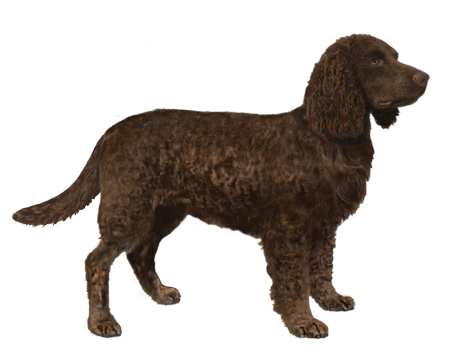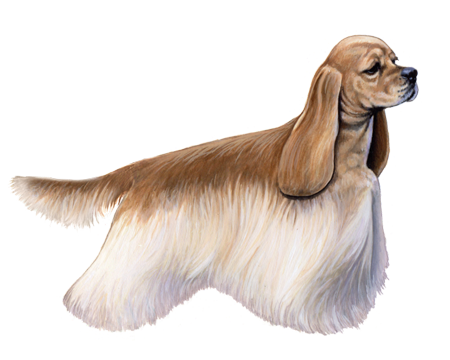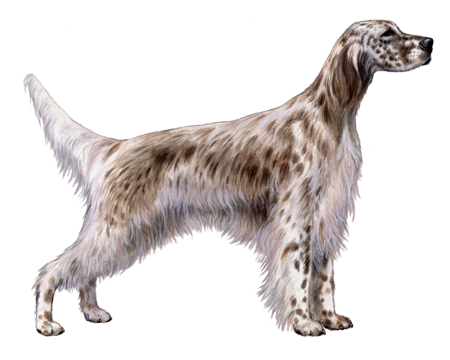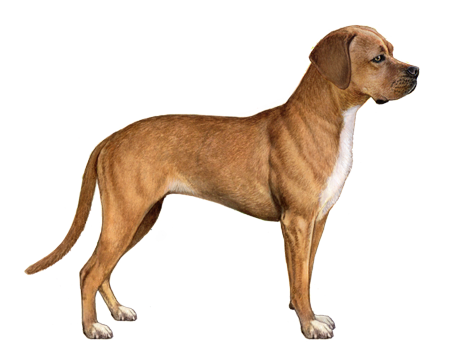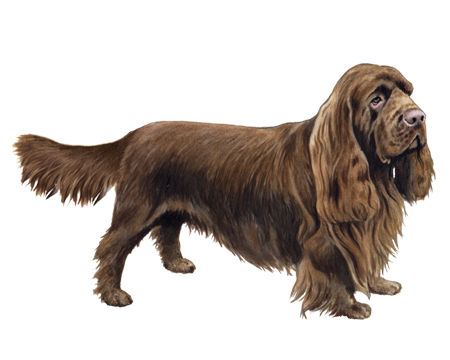
English Toy Spaniel (King Charles Spaniel)
The English Toy Spaniel is a gentle and loving breed. Eager to please and friendly toward people and animals, English Toy Spaniels make excellent companions and wonderful pets.
Interested in discovering if your dog is an English Toy Spaniel (King Charles Spaniel)?
Check out Wisdom Panel's DNA tests.

English Toy Spaniel (King Charles Spaniel) Traits
General Appearance
English Toy Spaniels are compact, sturdy, square-shaped toy dogs. They're known for their pushed-in nose, domed head, affectionate demeanor, and silky, flowing coat.
Coat and Colouring
The English Toy Spaniel has a thick, glossy coat that can be straight or slightly wavy. There is heavy fringing on the ears, body, and chest, with feathering on the legs and feet.
Their coats come in four varieties, each with a unique name: Blenheim (red and white), Prince Charles (black and tan with white markings), King Charles (black and tan), and Ruby (red). These varieties may have a small white spot on the chest. The coats in Prince Charles and King Charles varieties are longer than the other two.
Distinctive Physical Traits
The English Toy Spaniel has a recognizable dome-shaped head that's large in comparison to its overall size. Its muzzle is very short, with the nose pushed back and ample cushioning under the eyes. It also has a slight underbite.
The breed's dazzling eyes are large, very dark brown or black, and set squarely in line with the nose. Many English Toy Spaniels are born with a shorter or screw tail.
English Toy Spaniel (King Charles Spaniel) Temperament
English Toy Spaniels are a gentle and loving lap dog that doesn't require a lot of exercise, making them a great breed for apartment living or less active households.
Calm, happy, and playful family dogs, English Toy Spaniels are typically friendly towards strangers, kids, and other pets. However, careful training is needed to keep them from developing small dog syndrome (i.e., the perception that they're bigger than they truly are).
Though they're intelligent and eager to please, English Toy Spaniels can sometimes be stubborn. Overall, this breed needs consistent training and lots of attention to be happy.

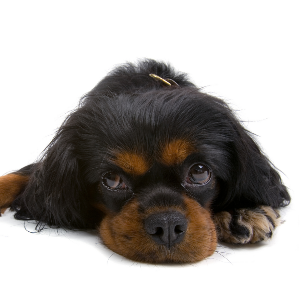
English Toy Spaniel (King Charles Spaniel) History
The English Toy Spaniel originated in Great Britain during the Renaissance era as a companion dog for royalty.
During the 17th century, English Toy Spaniels were constantly at the side of King Charles I of England. As a result, they earned the name "King Charles Spaniel," as well as the more colloquial "Charlie." (Outside of the United States and Canada, people still refer to the breed by these names.) They were also sometimes called "comforter spaniels," as they served as lap or foot warmers.
The breed's modern (and very cute!) appearance is the result of crossing short-snouted Japanese toy breeds, such as the Pug or Japanese Chin, with small, long-snouted European spaniels. Throughout early breeding, English Toy Spaniels began to inherit keen hunting qualities. As centuries passed, however, these qualities diminished. Today, they are lap dogs once again—a role they continue to excel at and seem to thoroughly enjoy.
The American Kennel Club admitted the English Toy Spaniel in 1886, making it the third recognized breed in the Toy group.
English Toy Spaniel (King Charles Spaniel) Care
Nutrition
English Toy Spaniels have little stomachs that don't allow them to eat big meals. So, it's best to break their food up into several small meals throughout the day.
This breed thrives on a diet formulated for their specific life stage (e.g., puppy, adult, senior). Additionally, a diet created for small-breed dogs will have the appropriate blend of nutrients and a smaller kibble size to properly chew and digest their food.
To keep English Toy Spaniels at an ideal weight, keep a close eye on the amount of food they eat each day. To avoid accidental overfeeding, portion out their food using a measuring cup. And don't forget to account for treats when considering their daily calories. Even a couple of extra treats can add up for such a small dog. As a guideline, treats should make up no more than 10% of your dog's calories.
Grooming
Brushing your English Toy Spaniel's long, silky coat at least twice a week will prevent painful mats and tangles. Regular baths and trimming around the face and paws will also help keep this breed looking its best.
The English Toy Spaniel's long ears may make them more susceptible to ear infections. For this reason, check and clean your pup's ears regularly to prevent infections from developing.
Toy breeds are more likely to have dental issues due to their small mouths and crowded teeth. Regular dental care, including at-home teeth brushing, is essential for their overall long-term health. Because of their increased risk of dental disease, English Toy Spaniels may require more frequent professional cleanings beginning at an earlier age.
Exercise
When not curled up on their favorite human's lap, English Toy Spaniels need moderate daily exercise. Leisurely walks outside and indoor play sessions are typically enough to do the trick.
Short-faced breeds like the English Toy Spaniel can't tolerate hot weather. They shouldn't be left outside or made to do strenuous activities on warm or humid days.
Training
English Toy Spaniels are a naturally well-behaved and typically obedient breed. However, they do benefit from a patient, consistent training style.
They are often food-motivated and respond well to reward-based training. However, some English Toy Spaniels can be picky eaters. So, it may take some trial and error to find a tasty treat they're willing to work for.
Finally, early socialization will help your English Toy Spaniel mature into well-adjusted adult dogs.

English Toy Spaniel (King Charles Spaniel) Genetic Health Conditions
-
Chondrodystrophy (CDDY) and Intervertebral Disc Disease (IVDD) Risk
Chondrodystrophy (CDDY) is a skeletal disorder characterized by shortened limbs and abnormal early degeneration of the spinal discs, or intervertebral disc disease (IVDD), which predisposes to disc herniation.
-
Muscular Dystrophy (Discovered in the Cavalier King Charles Spaniel)
Muscular Dystrophy is a severe disorder that causes muscle breakdown and weakness. DMD is characterized by a curve to the dog's back and a crouched posture. It typically affects males, although some females may also show some muscle weakness as well.
Knowing if your English Toy Spaniel (King Charles Spaniel) is a carrier or at-risk for these conditions can help you and your veterinarian plan for your pup's lifelong care. With Wisdom Panel™ Premium, you can get results for over 200 genetic health tests.
Breed Group
Sporting
The sporting group breeds are incredibly diverse in personality and appearance, but can be characterized as very sturdy. They were developed to work closely with people and in general have a very responsive nature and high intelligence.
Resources
https://www.akc.org/expert-advice/lifestyle/things-didnt-know-english-toy-spaniel/
http://images.akc.org/pdf/breeds/standards/EnglishToySpaniel.pdf
https://www.akc.org/dog-breeds/english-toy-spaniel/
Reviewed 26 July 2020 by Cindy Elston, DVM, MPH




